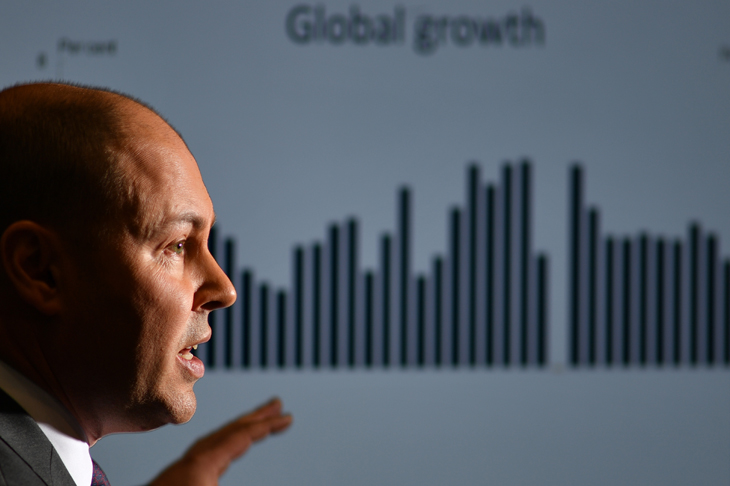I don’t like praising politicians, but I feel Scott Morrison and his colleagues and even the premiers have been treated unfairly during the coronavirus pandemic. People say that politicians use language that is too complicated and cannot explain in words of one syllable just how we are going to bring this ghastly pestilence under control and save the economy. For my part, I think our leaders have all been crystal clear and that the people really do understand what they are being told and have been inspired by it, as I certainly have. Their prose has been very eloquent and precise. For instance, the other day I was listening to Josh Frydenberg’s speech on the economy and I was thinking what a masterpiece of clarity and elegance it was. In fact, I was out walking around Melbourne on a few errands shortly after that to see if the speech had made any impact and found that the people were talking about little else, particularly the Treasurer’s analysis of ‘the trajectory of our national economic recovery’ which had really caught on as an almost Churchillian inspiration.
Fiscal policy, in particular, had definitely captured the people’s attention; those I spoke to told me they valued the fiscal update, appreciated the need for fiscal discipline, were alarmed by the approaching fiscal cliff, agreed that there was a need for an appreciation of fiscal metrics before any major fiscal measures were undertaken and that they certainly understood that fiscal deficits and sharply higher debt could lead to a worse fiscal outcome.
But to obtain a real appreciation of the understanding and effect of the speech, I knew that I would have to test the multicultural waters at Beppe’s Coffee. And I swear that I had scarcely got my order in for a half soy macchiato latte when Beppe started on about whether aggregate demand could be relied on to encourage an improvement in supply side metrics. His friends joined in, clearly thrilled by the notion that there might, even at this late hour, be a return to Mrs Thatcher’s commitment to monetary policy and the pivotal role of M3. They were always fascinated by it, of course, and I well remember the good old days when I was a member of parliament and was deluged with requests for copies of her famous speech on the European Exchange Mechanism.
Then, when I made my modest purchase at Bernie’s Butchers, his lighthearted riposte showed that he was clearly abreast of the issues outlined so persuasively by the Treasurer. ‘Well’, he observed as he put a meat axe through a side of lamb, ‘that should make quite an impact on gross non-farm product.’
It was true that there was some concern about gross debt and its evil cousin, debt servicing costs, but the consensus emerged amongst the customers at Happy Hammer Hardware that with a proper recognition of infrastructure and the role of Homebuilder, together with the promised reforms to the Liquid Assets Waiting Period, we could be confident that household consumption would rise while preserving the structural integrity of most verticals and not increasing gross debt as a proportion of GDP.
Moreover, the view was held strongly by both the clientele and management at Saigon Nail and Lash that the JobTrainers skills package, the higher education relief package and the National Fund for JobSeekers would all contribute to the heavy lifting required at the margins, provided eyebrows were included.
Then I reflected that it was really much the same when the PM and the premiers addressed the nation on the pandemic and when, with laser-like precision, they summed up the entire national struggle with the battle cry ‘We are all in this together’. And how that was clearly understood as a national rallying cry that brought the nation together in its darkest hour. From the humblest Islamic security guard with no training and no English, happily partying and sleeping with the quarantined guests in Melbourne’s hotels, to the progressive masses holding their effervescent demonstrations to show that black lives matter and with no unseemly arrests or fines to mar that worthy civic project, to the liberating spirit of releasing passengers from the Ruby Princess infected with the disease, to the benevolent oversight of our aged care facilities so the inmates could die in peace without troublesome relatives arguing about the will, to the footballers who could enjoy their happy groping and cavorting without any troublesome restraints. The nation had truly risen and rallied to this unifying call from our leaders.
And all the time there are clear policy lines that are a guide to all citizens with which they can comply, simply because they are so clear, consistent and understandable; schools are open except when they are closed before they are half-opened and completely closed; masks are unnecessary and counter-productive until they are recommended in NSW and compulsory in Victoria; sport is banned, except for golf that is banned, allowed in Stage 3, and banned again in Stage 4; hairdressers are closed, but then opened; markets are closed unless they are supermarkets, in which case they are open. Medibank is closed; Optus is open; and we must all use an app that you can turn off and has never detected anything. These measures have been crystal clear but at the same time a hymn to flexibility and a relief from rigid government regulation that has benighted us for years. And, refreshingly, the Victorian premier is consistent; it is a unifying discipline to know that we are all to blame because we are all equal, particularly the young, people who live in public housing towers, big ethnic families and ordinary people who will not do what they are told and who have disappointed him. That is the guidance we have needed and obtained in startling clarity.
We owe our leaders an enormous vote of thanks.
Got something to add? Join the discussion and comment below.
Get 10 issues for just $10
Subscribe to The Spectator Australia today for the next 10 magazine issues, plus full online access, for just $10.
You might disagree with half of it, but you’ll enjoy reading all of it. Try your first month for free, then just $2 a week for the remainder of your first year.















Comments
Don't miss out
Join the conversation with other Spectator Australia readers. Subscribe to leave a comment.
SUBSCRIBEAlready a subscriber? Log in